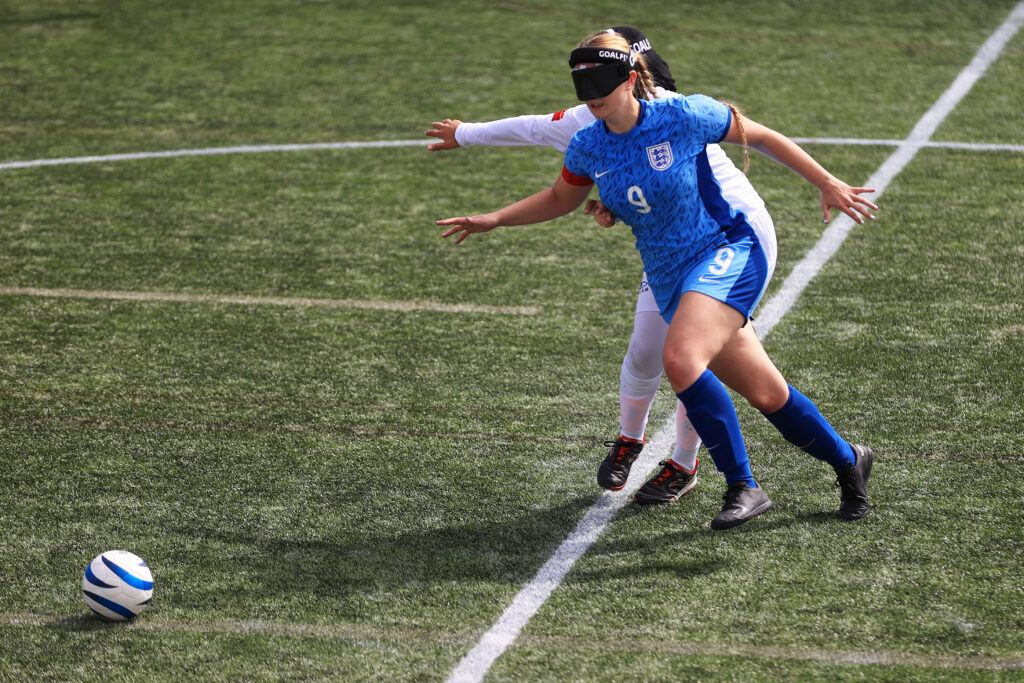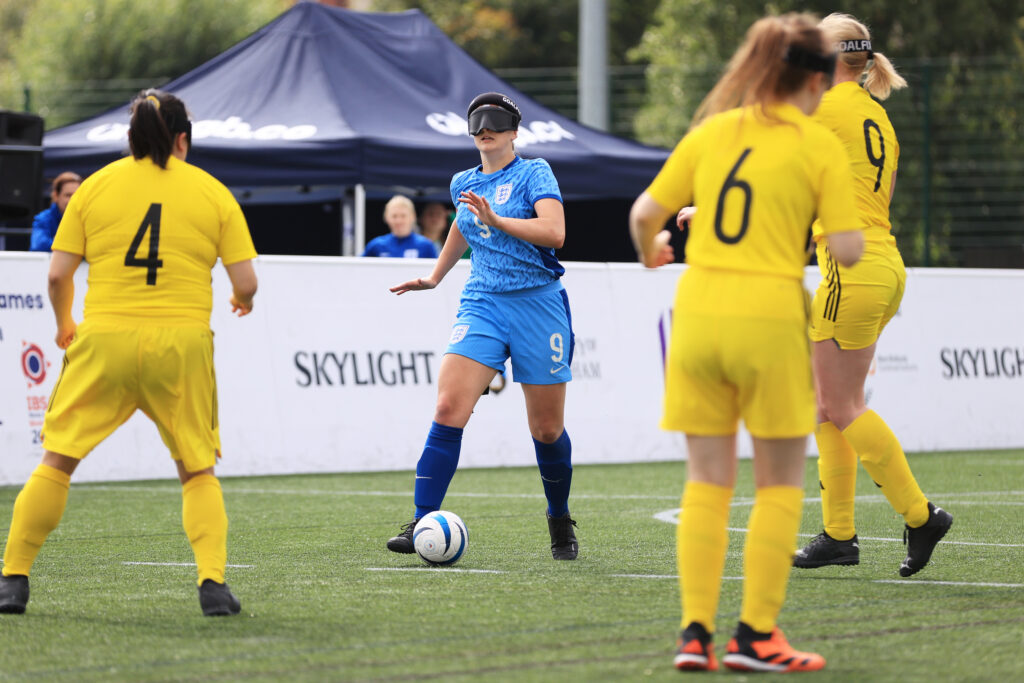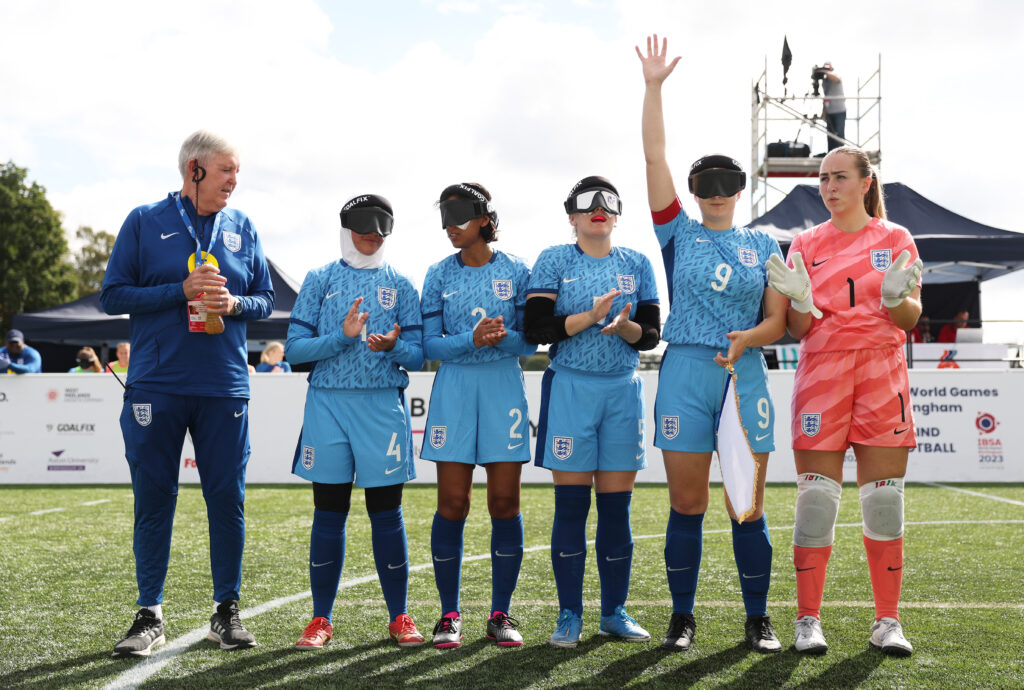“Sport saved my life”: Sam Gough on women’s blind football, her exclusion from sport and captaining England
Not that long ago Sam Gough had been “labelled a hazard” and excluded from sport altogether. Yet this summer, at just 20-years-old, she pulled on the captain’s armband to lead the Blind Lionesses in the inaugural IBSA Women’s World Championships.
The tournament marked another milestone for women’s sport as the England Women’s Blind football team took to the pitch in front of a home crowd in Birmingham.

“We all made history that day,” Gough emphasises. “I’m so proud of the girls. Our goal from the very beginning was to get to the IBSA World Games. We got there.”
Yet the journey to get there has not been easy. Gough has faced barriers most athletes would never contemplate having to overcome to even step foot on a pitch.
“I was excluded from sport altogether”
Growing up in a sporting household, where her brothers provided inspiration as competitive swimmers and footballers, Gough had a ball at her feet from a young age.
“I was running cross country for the school, I was swimming for the school, and I did football for the school as well,” she says.
But in 2019, Gough went from being registered partially sighted to severely sight impaired. She became unable to read print and, adding to the challenges this already presented, her school failed to accommodate for these changes.
“I was excluded from sport altogether,” says Gough. “Instead of asking me questions, like ‘how can we support you?’ they just labelled me as a hazard and then removed me altogether.
“I did give them resources, like a blind football (a ball with a bell in it) and different equipment that they could use, but they didn’t take it at all.
“There was a lot of bullying that went on as well which can be soul destroying. It’s why I’m so passionate about inclusion for sport.”
“I fell in love with blind football”
Gough was not deterred. She soon attended a Scottish Disability Sport visual impairment ‘Have A Go’ day, where athletes could try a range of sports, only to discover more barriers lay in her way.
“It was all down in England if you wanted to take it further,” she explains. “You can imagine coming from Scotland and trying to find a sport that you love, being told everything is down in England is a lot.”

Still not discouraged, she was to make the first of many journeys southwards to the Royal National College for the Blind (RNC) in Hereford. The RNC boasts one of only two blind football pitches in England, but the facility provided the touchpaper to set Gough’s dream alight.
“I got to try blind football which was a crazy experience. I absolutely fell in love with it,” she enthuses.
“Prior to that, all I knew about football is I had wanted to play growing up. I had trained for two weeks in my back garden with my brother for trials at our local club.
“I’d been so excited but because of my visual impairment I was told I couldn’t do it. I thought I had to give up that dream of ever playing football.
“It’s crazy how I’m now captain of the England Blind Lionesses and how my tables have turned.”
Since then, not only has Gough excelled at football, but she has also won bronze with GB in goalball at the U19s Para Youth Games and recently started rowing for the national talent squad.
So why has she not been recognised?
“A lot of people don’t know what blind football is”
There remains a lack of awareness around visual impairment and disability sport. According to the RNIB, blind and partially sighted people are twice as likely to be inactive as people without sight loss.
“I don’t think a lot of people even know what blind football is,” she says.
The FA are hoping to rectify this through their ‘Football Your Way Plan’ which aims to help develop, improve and raise awareness of disability football in England.

Similarly, the Blind Lionesses captain now wants to use her own platform as a force for good.
“I decided to go round schools in Scotland and share my journey to promote visually impaired sport,” says Gough.
“I think it’s so important to have role models to look up to so that other blind athletes know they can take part in sport with a visual impairment or without one.”
“Sport saved my life”
This advocacy is particularly meaningful to Gough who perhaps knows more than anyone just how important having access to sport and activity can be.
“I have struggled with mental health and sport saved my life,” she reveals. “I don’t say that lightly because it really did.
“For me, it’s more than just playing at the elite level. The community that comes with sport, especially with blind football, feeling needed and feeling wanted and feeling important. It means everything.”
Just as the advocacy for better accessibility and awareness continues, so too does Sam Gough’s remarkable sporting career.
“My main goal as an athlete is to win a Paralympic medal,” she declares. “I absolutely love doing what I do, even if I have to travel miles and miles and miles to do it, I absolutely love it.”
You can find information and ways to get involved in the Football Your Way Plan here: https://www.englandfootball.com/play/Disability-Football/football-your-way.